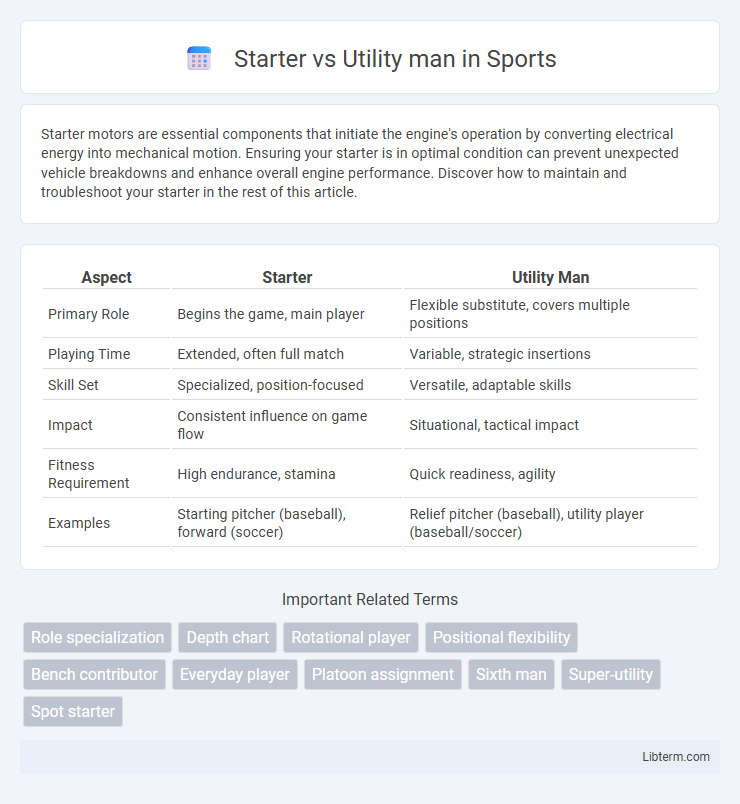Starter motors are essential components that initiate the engine's operation by converting electrical energy into mechanical motion. Ensuring your starter is in optimal condition can prevent unexpected vehicle breakdowns and enhance overall engine performance. Discover how to maintain and troubleshoot your starter in the rest of this article.
Table of Comparison
| Aspect | Starter | Utility Man |
|---|---|---|
| Primary Role | Begins the game, main player | Flexible substitute, covers multiple positions |
| Playing Time | Extended, often full match | Variable, strategic insertions |
| Skill Set | Specialized, position-focused | Versatile, adaptable skills |
| Impact | Consistent influence on game flow | Situational, tactical impact |
| Fitness Requirement | High endurance, stamina | Quick readiness, agility |
| Examples | Starting pitcher (baseball), forward (soccer) | Relief pitcher (baseball), utility player (baseball/soccer) |
Understanding the Roles: Starter vs Utility Man
Starters are primary players responsible for beginning games and establishing team momentum through consistent performance in key positions. Utility men provide versatile support by filling multiple roles as needed, ensuring flexibility and depth during injuries or strategic shifts. Understanding these roles highlights how starters drive game plans while utility men enhance team adaptability.
Key Responsibilities of a Starter
Starters primarily focus on initiating play by winning the tip-off and securing possession for their team, setting the tempo for the game. They are responsible for orchestrating offensive plays, facilitating ball distribution, and creating scoring opportunities. Defensively, starters guard key opposing players and maintain strategic positioning to prevent easy baskets.
Diverse Duties of a Utility Man
A utility man in baseball offers unmatched versatility by effectively playing multiple positions, including infield and outfield roles, unlike a starter who typically focuses on a single position. This adaptability allows teams to address injuries and strategic substitutions without compromising defensive or offensive strength. Utility men contribute significantly to roster flexibility, enhancing team dynamics and depth throughout the season.
Skills Required for Starters
Starters must possess advanced offensive skills, such as precise shooting, effective ball handling, and the ability to create scoring opportunities under pressure. They require strong game awareness, including strategic decision-making and spatial positioning, to lead the team's offensive execution. Physical endurance and consistency are also critical skills for starters to maintain high performance throughout the entire game.
Skill Set of a Utility Man
A utility man possesses a versatile skill set, enabling effective performance in multiple positions such as infield, outfield, and occasionally pitching roles. This broad adaptability requires strong defensive abilities, strategic game understanding, and reliable batting proficiency to fill gaps as needed. Their flexibility provides crucial depth and tactical options for the team, optimizing overall roster efficiency.
Impact on Team Performance
The Starter typically sets the tone for team performance by consistently delivering high-quality work during key project phases, directly influencing overall productivity and morale. The Utility man enhances team adaptability by filling diverse roles and addressing unexpected challenges, ensuring operational continuity and flexibility. Balancing the Starter's specialized skills with the Utility man's versatile contributions maximizes team effectiveness and resilience in dynamic environments.
Flexibility vs Specialization
A Starter provides flexibility by consistently delivering strong performance across multiple roles, making them essential for setting the game's pace and adapting to various game situations. In contrast, a Utility man specializes in versatility, excelling in multiple specific positions and strategic scenarios, offering managers tactical options for short-term adjustments. The trade-off lies in the Starter's reliable consistency versus the Utility man's ability to fill gaps and create matchup advantages.
Salary and Career Prospects
Starter players typically earn higher salaries due to their consistent starting roles and visible impact on team performance, with average earnings often exceeding those of utility men by 30-40%. Utility men, valued for their versatility and ability to fill multiple positions, usually earn moderate salaries but can extend their careers by adapting to various team needs. Career prospects for starters often include higher endorsements and leadership roles, while utility men benefit from job security and opportunities in coaching or mentoring due to their broad skill set.
Common Misconceptions
The common misconception about Starter vs Utility men is that their roles are interchangeable, while in reality, Starters focus on initiating processes or projects and Utility men provide versatile support across various tasks. People often underestimate the Utility man's adaptability, assuming they have a limited skill set, whereas their value lies in multi-functional problem-solving. Understanding these distinctions enhances team efficiency and clarifies role expectations in professional environments.
Deciding Which Role Fits You
Choosing between a starter and a utility man depends on your skillset and adaptability in baseball. Starters thrive with consistent playing time and specialized roles, while utility men offer versatility by covering multiple positions and providing strategic depth. Assess your strengths in steady performance versus flexibility to determine which role aligns best with your career goals.
Starter Infographic

 libterm.com
libterm.com